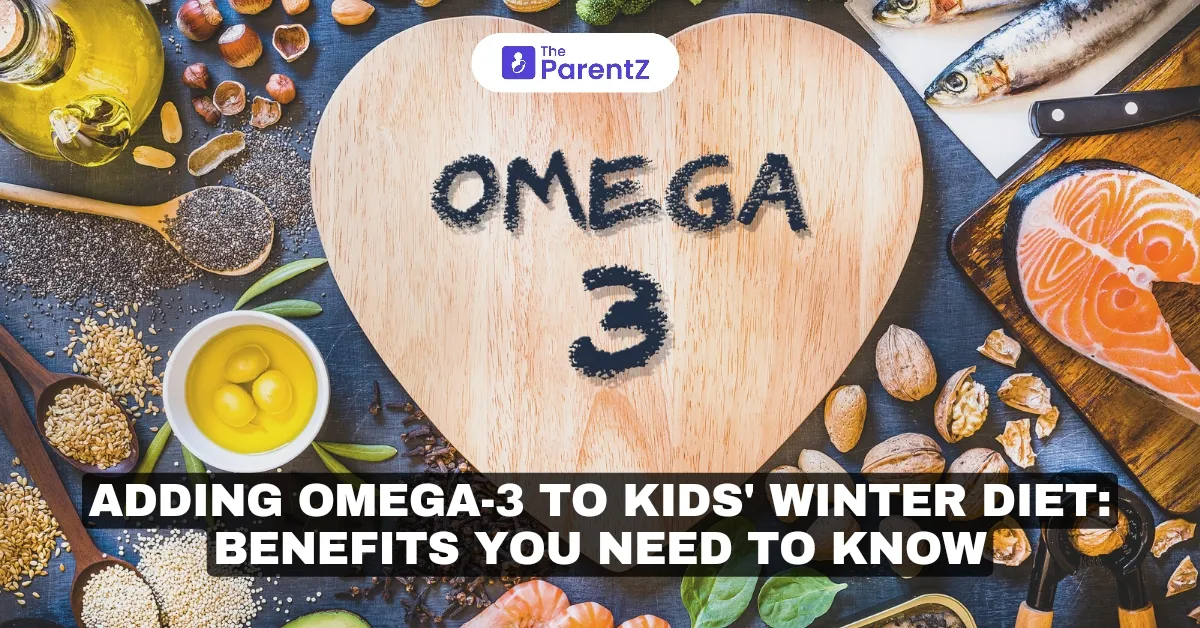Just a woolen sweater and cozy blanket are not the only things your little one needs during the chilly winter days. Their growing bodies need something equally essential—nutrition that supports immunity, brain health, and overall development. One of these nutrients that often goes unnoticed while dietary planning is omega-3 fatty acids. Adding this essential nutrient to the winter diet can play a big role in your child’s health.
Read this article to explore the health benefits of Omega 3 in your kid’s winter diet.
Importance of Omega 3 in Your Kid’s Diet
Omega-3 fatty acids, especially DHA (docosahexaenoic acid) and EPA (eicosapentaenoic acid), are essential for brain development, vision, and immune support in both adults and kids alike. During the prime growth years as kids, these fatty acids play a big role in shaping their physical and mental health. In fact, according to the National Institutes of Health, Omega-3 is also associated with better focus, performance, and reduced risk of chronic diseases.
Since, in winters, kids are often more prone to colds, flu, and skin issues, Omega-3 helps boost immunity, reduces inflammation, and even helps keep their skin soft and hydrated during the dry season. And the benefits don’t end here—it’s also known to improve sleep quality, a great thing for restless kids during those chilly days.
Significant benefits of incorporating Omega 3 in your kid’s diet during winters
Here are some significant benefits of incorporating Omega 3 in your kid’s diet during winters.
Stronger Immunity
Winter is synonymous with runny noses and sneezes. Omega-3 is known to reduce inflammation and boost the production of white blood cells, which are considered the first line of defense against infections. In a research study, it was found that Omega-3 supplementation reduced upper respiratory infections by almost 25 percent.
Supports Brain Development
Holidays also mean exams and some creative activities such as puzzles and crafts. Omega 3 helps in memory retention and cognitive function, giving your child an edge in both play and studies.
Improved Skin Health
Cold weather can often leave kids with dry and itchy skin. Omega-3 improves the skin’s natural barrier by keeping it moisturized and protected from winter dryness.
Better Sleep
Winter days are longer, and these longer nights probably call for better sleep cycles. Omega-3 is associated with the production of melatonin, the sleep hormone, so your child can get restorative sleep even on those frosty nights.
Natural Sources of Omega-3
Here are a few fantastic sources that you can incorporate in your child’s diet to fulfill their daily intake of Omega 3.
- Fatty fish such as salmon, mackerel, and sardines. Just a small grilled salmon fillet can provide up to 500 mg of Omega-3.
- Chia seeds are packed with ALA (alpha-linolenic acid), a plant-based omega-3.
- Walnuts deliver a good dose of Omega-3 and can be added to cookies or trail mixes.
- Flaxseeds are another powerhouse of omega-3.
- Eggs that are rich in Omega 3 are also available nowadays.
Takeaway
Adding Omega 3 to your child’s diet can help shield them from the season’s challenges while boosting their health. There’s no easier way to keep your children healthy during the winter months than to simply incorporate a few Omega 3-rich sources, which can truly make a big difference. Also, explore more about nutrient-dense food to improve immunity in kids.





Be the first one to comment on this story.